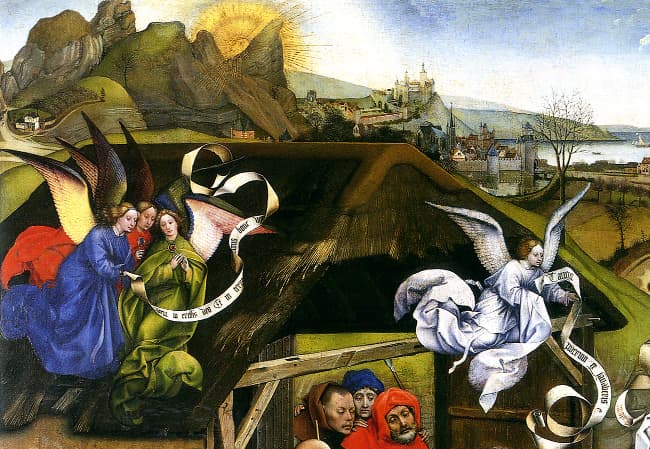Poem of the Day: ‘Christ’s Nativity’
Henry Vaughan’s Christmas is Christmas morning, filled with sun and birdsong. Yet this pure, reflexive joy turns into something more somber and introspective.

Today’s poem, “Christ’s Nativity,” illustrates the posthumous influence of the Anglican poet-divine George Herbert (1593–1633) on his Welsh disciple Henry Vaughan (1621–1695). Vaughan was only twelve when Herbert died. Despite some distant, tenuous family connection dating back to the Battle of Agincourt, the two never met. But in the late 1640s, reading Herbert’s poems, Vaughan experienced both a spiritual conversion and a clarification of his vocation as a poet. “A blessed man,” he wrote of Herbert, “whose holy life and verse gained many converts (of whom I am the least).”
The mountainous Welsh county of Brecknockshire, where Vaughan was born and passed much of his life, formed the setting for much of his early poetry, both for its natural beauty and for the depredations its people suffered at the hands of the puritan parliament during the English Civil War. Vaughan, married with children and practicing as a physician, was among those Anglicans and monarchists who lost their homes. Many of the poems written during this tumultuous decade of his twenties lament the deterioration of the peaceful, ordered life he had known.
Sometime at the end of the 1640s, Vaughan seems to have experienced some extra layer of crisis, possibly an illness, on top of the ongoing crisis of life as an Anglican during this period of upset. The poems born of that crisis marked the conversion he would attribute to the spiritual and literary example of George Herbert. “Christ’s Nativity” is one of those poems.
Appearing in the 1650 edition of his book “Silex Scintillans,” this poem exemplifies Vaughan’s new metaphysical mode. In its shape on the page and its rhyming couplets that shift from tetrameter to dimeter and back again, “Christ’s Nativity” bears Herbert’s fingerprints. Vaughan’s voice is his own: simpler than Herbert’s, less knotty and cerebral, more ventilated with outdoor air. His Christmas is Christmas morning, filled with sun and birdsong. Yet by stanza three, the speaker’s pure, reflexive joy has begun to turn to something more somber and introspective.
The human being, in his natural setting, is not part of nature, a bird or a star. He is first the filthy inn, with no room fit for the impending birth of a savior. Then he is the leper who says to Christ, “If thou wilt, thou canst make me clean.” This sense of his own uncleanness is pure Herbert. But a Herbert speaker, as in his famous “Love (III),” would instinctively resist the generosity on offer. Vaughan’s speaker, by contrast, like the biblical leper, begs for it, recognizing that only in that moment of healing and conversion can “the Lord of life be born in earth.”
Christ’s Nativity
by Henry Vaughan
Awake, glad heart! get up and sing!
It is the birth-day of thy King.
Awake! awake!
The Sun doth shake
Light from his locks, and all the way
Breathing perfumes, doth spice the day.
Awake, awake! hark how th’ wood rings;
Winds whisper, and the busy springs
A concert make;
Awake! awake!
Man is their high-priest, and should rise
To offer up the sacrifice.
I would I were some bird, or star,
Flutt’ring in woods, or lifted far
Above this inn
And road of sin!
Then either star or bird should be
Shining or singing still to thee.
I would I had in my best part
Fit rooms for thee! or that my heart
Were so clean as
Thy manger was!
But I am all filth, and obscene;
Yet, if thou wilt, thou canst make clean.
Sweet Jesu! will then. Let no more
This leper haunt and soil thy door!
Cure him, ease him,
O release him!
And let once more, by mystic birth,
The Lord of life be born in earth.
___________________________________________
With “Poem of the Day,” The New York Sun offers a daily portion of verse selected by Joseph Bottum with the help of the North Carolina poet Sally Thomas, the Sun’s associate poetry editor. Tied to the day, or the season, or just individual taste, the poems will be typically drawn from the lesser-known portion of the history of English verse. In the coming months we will be reaching out to contemporary poets for examples of current, primarily formalist work, to show that poetry can still serve as a delight to the ear, an instruction to the mind, and a tonic for the soul.
